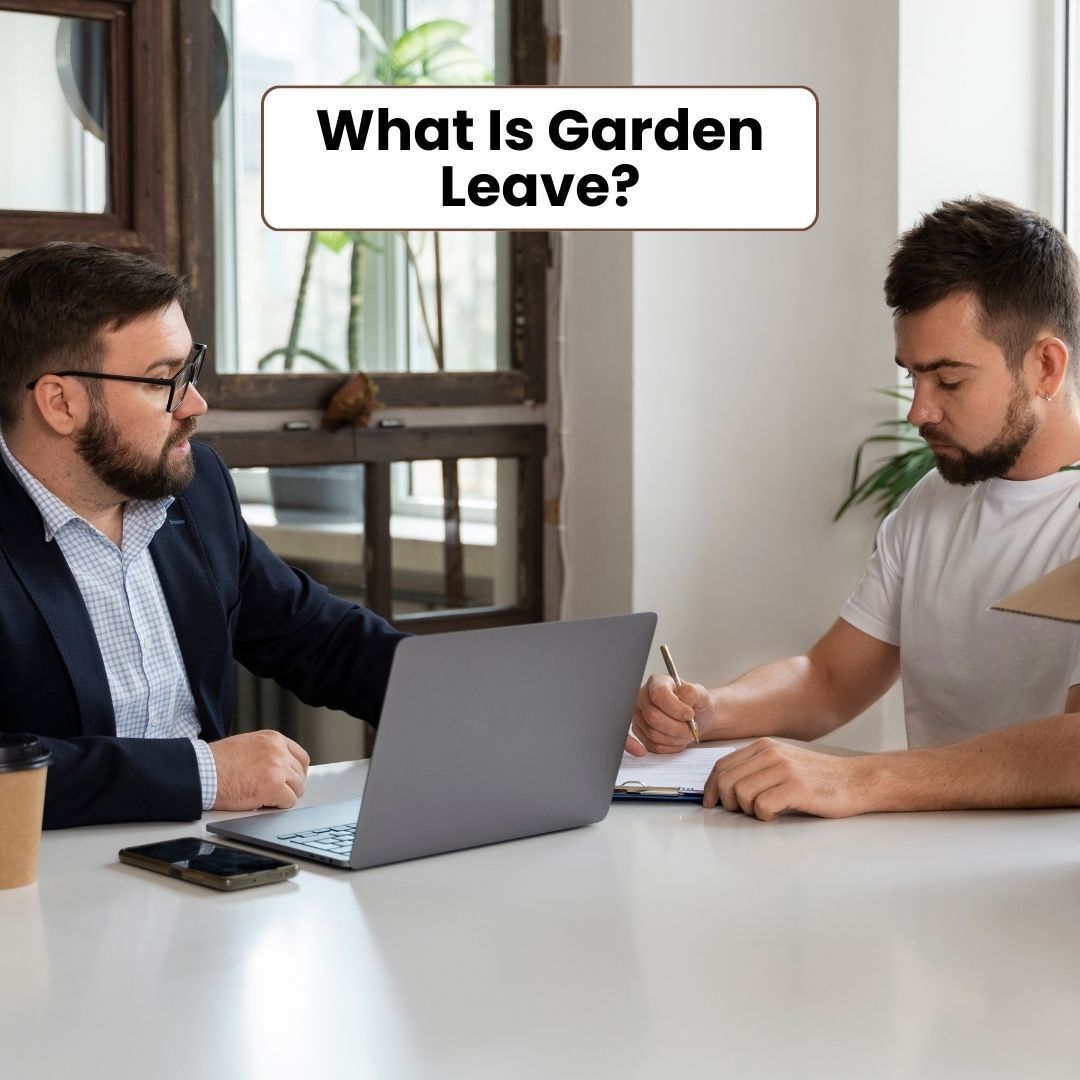What is Garden Leave? Your Complete Guide to Staying Protected
What is Garden Leave? Your Complete Guide to Staying Protected

If you’re someone who’s in HR, an employer, or an employee who is about to leave, you’ve probably heard the term what is garden leave, yet it still feels unclear. Many people in Stevenage, Peterborough, and Watford come to me with the same concern. They would like to have a better understanding of what their resignation would imply for their position, their team, and the weeks that come after they resign. We comprehend the ambiguity that it brings about as a result of witnessing it on a daily basis. For this reason, this book will take you through the concept in a straightforward and truthful manner. We’ll look at how it works, why employers use it, and what you should expect, so you can move forward with confidence instead of confusion
What Is Garden Leave?

Garden leave is a period when an employee stays away from work but still receives full pay during their notice period. It sounds straightforward, yet many people still ask how it actually works and what they can or cannot do during this time.
How It Works
During garden leave, the employee must
• stay available for any queries
• avoid working for another employer
• avoid contacting clients or accessing company systems
• adhere to the conditions that are outlined in their agreement
Garden leave works best when both sides understand the rules, so now let’s look at why employers rely on it in UK workplaces
Why Do Employers Use Garden Leave?

Employers place staff on garden leave to protect the business during change. Here are the practical and useful reasons for placing staff on garden leave.
Protect sensitive data and stop immediate access to systems.- Keep client relationships steady while handing over work.
- Reduce the risk of confidential knowledge reaching rivals.
- Provide time for a calm, managed handover and continuity planning.
- Limit the poaching of staff or clients during the notice period.
Real case: One of our
employment lawyer advised a Stevenage software firm whose lead developer handed in notice. We used garden leave to pause access, complete a clean handover and keep clients reassured; it saved weeks of disruption.
Next, we’ll cover whether garden leave is paid and what that means for you.
Is Garden Leave Paid?
Yes, when an employee is on garden leave, they normally stay on full pay and keep contractual benefits for the notice period. Key points:
Salary continues as per the contract.- The employer usually keeps pension contributions and benefits running.
- Commission and bonuses depend on the wording in the contract; some firms pay accrued commission, others do not.
- Employers may suspend bonus targets if the employment contract permits it.
Peterborough example: Once our
Employment Law Solicitors helped a payroll manager placed on garden leave; they kept their salary and pension but needed a written note confirming vested commission.
Next, we’ll weigh the real pros and cons for both sides
Pros and Cons of Garden Leave

Garden leave can feel calm on the surface, yet it brings practical wins and drawbacks for both sides. Here is a clear, balanced view that helps you see how it works in real workplaces.
From the Employer Perspective
Pros
It keeps the employee available for queries, which supports a steady handover.- It protects client relationships by preventing sudden contact changes.
- It shields confidential information by limiting access during notice, which also reduces exposure to risk.
- It discourages staff from joining a direct rival too quickly, giving the business some breathing room to reorganise.
Cons
It can be costly because the employer pays a full salary while receiving minimal work. This becomes sharper when senior staff are involved.- It offers limited productivity during the period, which some smaller firms consider difficult to justify.
- It requires full compliance with UK employment rules, which can change and add pressure to HR teams.
- If the company uses garden leave too often, it could negatively impact the company's reputation among potential candidates.
From the Employee Perspective
Pros
Employees continue to receive regular pay, which provides financial stability during a transition.- Workers usually do very little day-to-day work, which offers time to plan their next move.
- They can explore new job options quietly, though they cannot start the new role yet.
- They may keep bonuses and commission depending on their contract.
Cons
Limits on customer connections, new employment, and certain activities can feel constrictive to employees.- They may feel uneasy about earning pay without active work, especially if they prefer a rapid pace.
- Staff who are on garden leave may pause career growth during long garden leave periods, such as 90-day notices.
- They may worry about perceptions if the leave follows a dismissal rather than a resignation.
While these advantages and drawbacks help you see how garden leave works in real situations, many employers and employees still find the rules unclear. Tailored legal advice becomes crucial in this situation. The next section explains how an
employment solicitor can step in, cut through the confusion, and protect your position from the very start.
How an Employment Solicitor Can Help
Garden leave works smoothly when the rules are clear, the contract is solid, and both sides understand their rights. This is where an employment solicitor steps in and makes a real difference.
Why Legal Support Matters
- A lawyer confirms that the contract does, in fact, allow garden leave and explains what each party may and cannot do. A lawyer avoids disputes before they even start.
- They ensure that payments, benefits, and restrictions are compliant with UK law, which protects both sides from unexpected claims.
- They guide employers and employees through the negotiation stage so the process stays fair and measured.
Support for Employers
- They examine contracts to make sure the clause is unbreakable. Without it, employers risk breaching the agreement.
- They act fast if the employee contacts clients or accesses systems during notice, helping the employer enforce terms.
- They secure injunctions when needed, especially in cases involving client lists or confidential data.
Real outcome:
An
employment solicitor near me once called me when their consultant accessed old accounts after being placed on leave. I stepped in, issued notices and restored compliance before it escalated.
Support for Employees
- They explain whether the employer is allowed to enforce garden leave. If not, the employee may have grounds to challenge it.
- They verify if payments, commissions, or benefits are handled correctly throughout the notice period.
- They step in when restrictions feel unreasonable or the employer stretches the leave unlawfully.
Real outcome:
An employee on leave in Peterborough experienced pressure to adhere to extra rules that were not part of her contract. I made her rights clear, changed the employer's strategy, and resolved the issue amicably.
At
Fosters Legal Solicitors, we handle these situations daily and bring steady guidance to every case, whether simple or complex. In the next section, we will look at how long garden leave usually lasts and what shapes that timeline.
Conclusion
Simply put, garden leave is a time when you remain employed, get your salary, and are not permitted to work elsewhere until your notice period expires. It protects both sides when it is handled with the right clarity and the right advice.
If you are dealing with a garden-leave situation and want to understand your rights or your options, our team at Fosters Legal Solicitors is ready to guide you with calm, experienced support. Reach out to us for straightforward help before you take your next step
Freqently Asked Questions
Is garden leave the same as redundancy?
No, they are different. Garden leave is a notice-period arrangement where you stay employed but do not work. Redundancy is when your role is removed, and your employment ends with a redundancy payment if you qualify.
What is the purpose of garden leave?
Its main purpose is to protect the employer’s business while keeping the employee paid. It stops the employee from joining a competitor, contacting clients or accessing sensitive information during the notice period
Is garden leave a bad thing for employees?
Not usually. Employees stay on full pay and keep their benefits while stepping away from day-to-day work. Problems arise only if the terms are unclear, which is why checking the contract helps
What are the three types of termination?
The main types are voluntary resignations, dismissals by the employer, and redundancies. Each one follows different rules and may offer different rights and payments
How long can a company put you on garden leave?
Typically, these types are applicable for the duration of your notice period. Some contracts allow for longer notice periods, but this is only valid if it is reasonable and explicitly stated in the agreement
Can you put someone on garden leave during a redundancy consultation?
Yes, but only if the contract includes a garden-leave clause. If the clause is missing, placing someone on garden leave during consultation can lead to a dispute or breach-of-contract claim.












